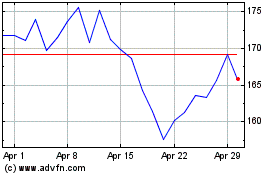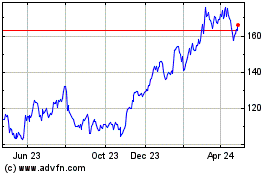By Lingling Wei and Yoko Kubota
BEIJING -- When a group of American executives and other global
corporate chieftains met with Chinese Vice President Wang Qishan in
late March, they received a stern message about the simmering
U.S.-China trade conflict: If tensions escalate, buckle up.
"The message was pretty clear," said a person who attended. "A
lot of companies would become victims in a U.S.-China trade
war."
That is what American multinationals are now bracing for, after
the Trump administration said it would move ahead with 25% tariffs
on $50 billion in Chinese goods. Beijing said in response to the
U.S. move Friday that it would retaliate in "equal scale and equal
strength."
While a battle between the world's two largest economies would
inflict pain on businesses and consumers in both countries, in the
crosshairs, in particular, are multinationals with a footprint in
the mainland.
A sophisticated global supply chain means many foreign companies
nowadays assemble their products in China with parts bought
elsewhere, and then sell to the U.S. and other markets. That leaves
them vulnerable to any new U.S. sanctions as well as pressure and
other retaliation from Beijing.
Foreign-invested companies, including firms from Hong Kong and
Taiwan, produce 43% of China's exports, according to an analysis by
the Conference Board, a New York think tank. The manufacturers
among them notably make up 77% of China's exports of information
and communications technology -- a sector highlighted by the Trump
administration for new tariffs.
At the March gathering, people who attended said, Mr. Wang told
the business leaders -- which included senior executives from
International Business Machines Corp., chip maker Qualcomm Inc. and
private-equity firm Blackstone Group -- that they should try harder
to lobby the Trump administration against launching a trade
offensive.
The U.S. said on Friday the trade levies are designed to hit
products linked to Chinese strategic plans to dominate new
high-technology industries, and released a list that covers 1,102
categories of goods. Though China didn't immediately announce its
targets, a previously issued list proposed penalizing U.S. farm
exports, smaller commercial passenger planes and other goods.
While multinationals assess the potential impact from the
escalation of trade tensions, makers of consumer electronics have
been canvassing suppliers and, in the case of at least two
personal-computer makers, inquiring about shifting some of
production in China to the U.S.
Foxconn Technology Group of Taiwan, the world's largest contract
manufacturer of electronics and known for assembling Apple Inc.'s
smartphones in China, conducted a review of its supply chain, said
a person familiar with the matter. The review, which assessed the
proficiency of Chinese suppliers, could be used to assess the
impact of potential tariffs, the person said.
It isn't clear if Foxconn is taking any action following the
review; the company didn't respond to a request for comment late
Friday.
The new U.S. tariffs exempt commonly purchased consumer goods,
according to the U.S. Trade Representative. Semiconductors -- the
guts of smartphones and many connected devices -- were put on the
target list, drawing protest from the Semiconductor Industry
Association. The Washington-based trade group said that most
semiconductors exported from China are designed and made in the
U.S.
Boeing Co. is likely to feel the pain from both sides, though it
stands to get hurt more by potential Chinese retaliation. Boeing,
the largest U.S. exporter, delivered 202 aircraft to China last
year -- more than a quarter of its total global sales. Past rounds
of political tensions with the U.S. have seen China switch its
purchases to rival Airbus SE , and Chinese state media have warned
to expect the same this time.
Boeing also buys some parts for its 737 and 787 jetliners from
Chinese suppliers, mainly the state-run Aviation Industry Corp. of
China. The latest U.S. tariffs include some China-made aerospace
products, potentially jacking up the costs of those components for
Boeing. But they constitute a small part of Boeing planes' total
value, according to aviation analysts.
Also hanging in the balance is Qualcomm's planned $44 billion
purchase of Dutch company NXP Semiconductors NV , a deal widely
seen as critical for the U.S. chip maker. Late last month, amid
signs of progress in trade talks by Washington and Beijing, Chinese
authorities indicated their intention to wrap up the review and
clear the transaction.
Momentum, however, stalled following the White House decision to
move ahead with tariffs and congressional pushback against Mr.
Trump's decision to save China's ZTE Corp . from crippling
punishment for violating U.S. sanctions.
"The anticipated escalation of trade tensions will complicate
China's ability to approve the Qualcomm-NXP transaction from a
face-saving perspective," said Stephen Myrow, a former Treasury
official in the George W. Bush administration who is now managing
partner of Beacon Policy Advisors LLC., a U.S. research firm.
The U.S. is stepping up its trade offensive over what the Trump
administration alleges is Beijing's pressure on U.S. firms to
transfer technology to Chinese companies. In doing so, the U.S. is
effectively ending a truce called late last month by U.S. Treasury
Secretary Steven Mnuchin and China's chief trade negotiator Liu He,
following the second of three rounds of talks.
"Three rounds of negotiations with Beijing have failed to delay
or prevent this outcome," said Tai Hui, chief market strategist at
J.P. Morgan Asset Management. "The threshold to come to a consensus
or a compromise seems high."
Some Chinese officials said they are feeling frustrated by the
Trump administration's shifting positions, which they say have hurt
the credibility of the U.S. government. The U.S. is "provoking the
trade war, " Chinese Foreign Ministry spokesman Lu Kang said Friday
night.
Washington's latest hard-line approach, Chinese officials said,
isn't going to wring concessions from China.
In particular, Beijing isn't going to give up its plan to
upgrade its manufacturing capabilities as laid out in the Made in
China 2025 initiative -- specifically targeted by the new U.S.
tariffs to prevent "unfair transfers of American technology and
intellectual property," the Trump administration said.
"It's wrong for the U.S. to think its pressure tactics are
working," said a Beijing official.
Already, some U.S. companies are facing increased regulatory
scrutiny in China, according to Jacob Parker, vice president of
China operations at the U.S.-China Business Council. For instance,
he said, it takes longer for their products, be they automobiles,
pork or other farm products, to clear Chinese customs; in other
instances, Chinese regulators are putting advertisement slogans by
U.S. firms under review.
"Maintaining a low profile in the China market and ensuring that
you're completely compliant are more important now than in the
past," Mr. Parker said.
--Trefor Moss in Shanghai contributed to this article.
Write to Lingling Wei at lingling.wei@wsj.com and Yoko Kubota at
yoko.kubota@wsj.com
(END) Dow Jones Newswires
June 15, 2018 13:30 ET (17:30 GMT)
Copyright (c) 2018 Dow Jones & Company, Inc.
QUALCOMM (NASDAQ:QCOM)
Historical Stock Chart
From Aug 2024 to Sep 2024

QUALCOMM (NASDAQ:QCOM)
Historical Stock Chart
From Sep 2023 to Sep 2024
